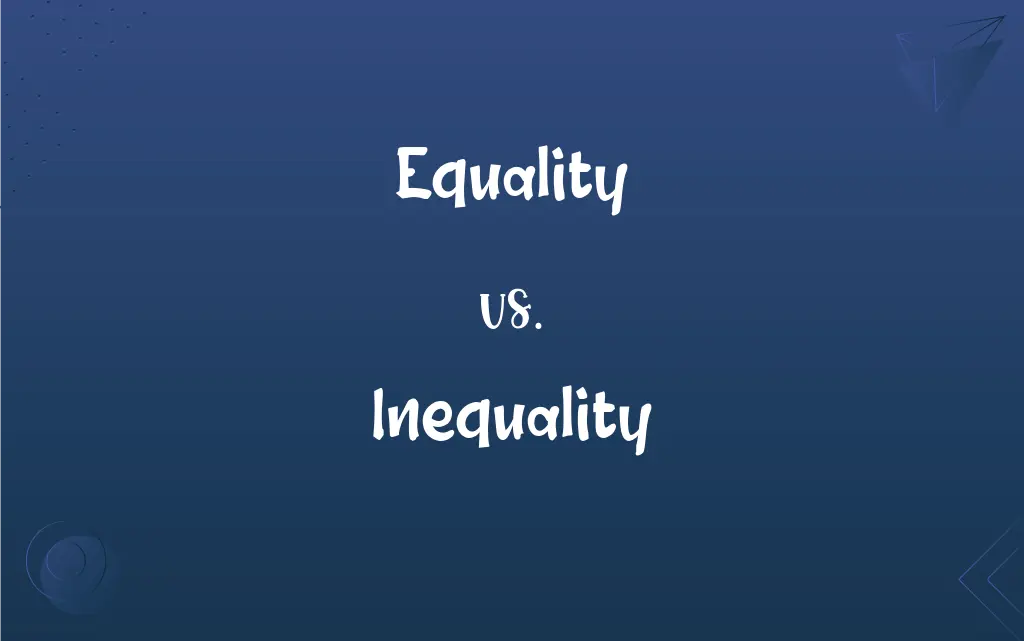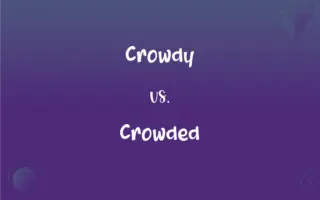Equality vs. Inequality: What's the Difference?
Edited by Aimie Carlson || By Harlon Moss || Updated on November 8, 2023
Equality means the state of being equal, especially in status, rights, or opportunities; inequality denotes the condition of being unequal or unfair.

Key Differences
Equality and inequality are two concepts that stand in contrast to one another. Equality refers to the state of being the same in quantity, value, rank, or ability. It implies a balance and fairness where everyone is granted the same rights and opportunities. Inequality, conversely, suggests a disparity where this balance is absent, leading to a situation where some individuals or groups have more advantages, resources, or rights than others.
Equality is often a goal or ideal in social, economic, and political contexts, representing a situation where everyone has access to the same opportunities and is treated without discrimination. Inequality, on the other hand, is typically viewed as a problem or issue to be addressed, indicating a gap between different segments of society in terms of their access to economic resources, social standing, or political power.
Equality can be measured and strived for, as in the case of gender equality, where both men and women are seeking the same level of respect, pay, and opportunity. Inequality manifests in various forms such as income inequality, racial inequality, and gender inequality, highlighting the differences in how various groups are treated or compensated.
The concept of equality can also extend to the law and social justice, indicating that all individuals are subject to the same laws and are given equal representation within the legal system. Inequality can denote social injustice, where the law or societal norms benefit some groups over others, creating an environment of discrimination and lack of fairness.
While equality aims for uniformity and equivalence among all individuals, inequality reveals the divisions and hierarchies that exist within societies. It is often the basis for social movements that aim to reduce the disparities and create a more equitable world.
ADVERTISEMENT
Comparison Chart
Definition
Sameness and fairness in treatment or distribution
Disparity and unfairness in treatment or distribution
Social Implication
A goal or ideal to achieve fairness
A social issue that prompts the need for change
Legal Association
Equal rights and protections under the law
Discrimination or bias in legal or social systems
Economic Aspect
Even distribution of wealth and opportunity
Unequal distribution of wealth and opportunity
Measurement
Standards and indices for social justice and parity
Gini coefficient and other indices to measure disparities
ADVERTISEMENT
Equality and Inequality Definitions
Equality
Balance in distribution or allocation.
The new policy aims for equality in educational resources.
Inequality
Disparity in treatment or opportunity.
She is campaigning to overcome gender inequality.
Equality
Fair treatment for all, without discrimination.
The law is supposed to guarantee equality for all citizens.
Inequality
The state of not being equal, particularly in life chances.
Inequality in access to healthcare is a significant issue.
Equality
Similarity in quality or status.
The twins fought for equality in their parents' attention.
Inequality
A situation where there is an unfair difference or gap.
Income inequality is rising globally.
Equality
Sameness in quantity or measure.
Mathematical equations are based on the principle of equality.
Inequality
A mathematical relationship indicating difference in size or amount.
In the equation a < b, there's an inequality between a and b.
Equality
The state of being equal, especially in rights and opportunities.
The company promotes equality in the workplace.
Inequality
A lack of smoothness or uniformity in social status.
Educational inequality often reflects broader social stratification.
Equality
The state or quality of being equal.
Inequality
The condition of being unequal.
Equality
(Mathematics) A statement, usually an equation, that one thing equals another.
Inequality
An instance of being unequal.
FAQs
What does "inequality" mean?
Inequality is the condition of being unequal or inequitable, often in terms of social, economic, or legal rights.
Can "equality" refer to mathematics?
Yes, in mathematics, equality denotes that two expressions represent the same value, shown by the symbol "=".
Does "inequality" always indicate something negative?
In a social context, it usually has a negative connotation, but in mathematics, it is a neutral term.
How is "inequality" used in mathematics?
In mathematics, inequality indicates that two values are not equal, represented by symbols like "≠", "<", or ">".
What is an example of "inequality" in society?
Income inequality, where there is a significant gap between the wealthy and the poor, is one example.
What are the common causes of "inequality"?
Discrimination, lack of access to education, and systemic biases are common causes.
What is an example of "equality" in society?
Gender equality, where men and women have the same rights and opportunities, is one example.
How can we achieve "equality" in the workplace?
Through equal pay, non-discriminatory hiring practices, and equal opportunity for advancement.
What does "equality" mean?
Equality refers to the state of being equal, especially in status, rights, and opportunities.
Is "equality" always about fairness?
Generally, yes, it implies fairness and impartiality, but context matters, as different needs may require different treatment.
What's "equality" in the context of law?
Legal equality means that all individuals are treated equally in the eyes of the law.
Can "equality" and "equity" be used interchangeably?
No, "equity" involves fairness and justice and may require unequal measures to achieve an equal outcome, while "equality" means giving everyone the same thing.
How is "inequality" addressed in economics?
It's addressed by policies aimed at redistributing wealth, providing social safety nets, and ensuring equal opportunities.
How does "inequality" manifest in education?
Inequality in education can appear as disparities in quality, resources, and access among different groups.
What is "gender equality"?
Gender equality is when people of all genders have the same rights, responsibilities, and opportunities.
Is "inequality" a social construct?
Yes, many aspects of inequality are based on societal constructions and can vary greatly between cultures.
What is "racial inequality"?
Racial inequality refers to disparities in treatment and opportunity among different races.
What is "social equality"?
Social equality is when all individuals have the same status in certain respects such as civil rights, freedom of speech, property rights, and equal access to social goods and services.
What is "income equality"?
Income equality refers to an economic scenario where the distribution of income among the population is equal or fair.
What is "marriage equality"?
Marriage equality refers to the legal recognition of marriage regardless of the gender of the partners.
About Author
Written by
Harlon MossHarlon is a seasoned quality moderator and accomplished content writer for Difference Wiki. An alumnus of the prestigious University of California, he earned his degree in Computer Science. Leveraging his academic background, Harlon brings a meticulous and informed perspective to his work, ensuring content accuracy and excellence.
Edited by
Aimie CarlsonAimie Carlson, holding a master's degree in English literature, is a fervent English language enthusiast. She lends her writing talents to Difference Wiki, a prominent website that specializes in comparisons, offering readers insightful analyses that both captivate and inform.































































